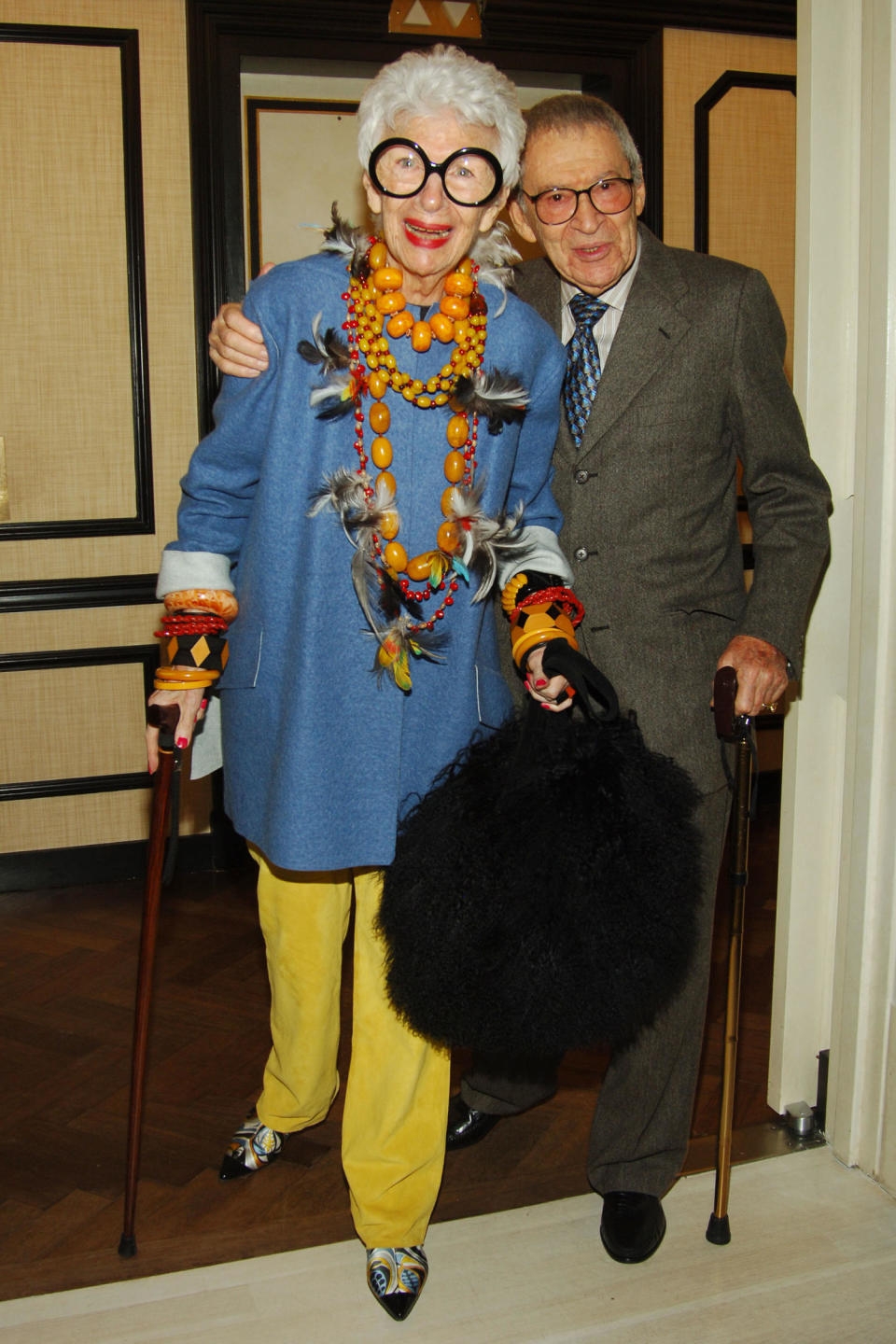Iris Apfel, fashion icon and interior designer, dies at 102
The world has lost a fashion icon.
Designer and fashion icon Iris Apfel has died at the age of 102.
The designer's verified Instagram account shared the news on March 1.
"Iris Barrel Apfel, August 29, 1921 — March 1, 2024," the account shared, alongside a photo of Apfel in a gold and black gown.
The photo was taken by one of Apfel's favorite photographers to work with, Ruven Afanador.
Her representative Lori Sale also confirmed Apfel's death to TODAY.com.
The fashionista — known for her large-rimmed spectacles and extravagant ensembles — was born on Aug. 29, 1921, in Queens, New York.
As a young woman, she worked at Women’s Wear Daily and studied interior design under Elinor Johnson. According to Sale, that is where she "honed her skill in décor that would transcend decades as she redressed homes for resale and lent her keen eye to sourcing the magical."
Eventually, Apfel and her husband, Carl Apfel (who died in 2015) founded Old World Weavers. The company sold and restored historic textiles — including at the White House, where they worked for nine presidencies. According to CNBC, it was there she earned the nickname "First Lady of Fabric" or "Our Lady of the Cloth."

As a prominent woman about town in New York City following her 1992 retirement from Old World Weavers, Apfel was known for her eclectic and bright style. The New York Times reported that her outlandish clothes became the basis for a last-minute exhibit at the Metropolitan Museum of Art in 2005.
"This is no collection. It’s a raid on my closet," she told the New York Times in 2005 amid the exhibit. "I always thought to show at the Met you had to be dead."
The exhibit was a roaring success and Apfel's fame skyrocketed in the years that followed. She became the toast of the town and immediately was enlisted for magazine spreads and ad campaigns. Apfel also became a visiting professor at the University of Texas and her legendary outfits were turned into an Eric Boman coffee table book.
“When you don’t dress like everybody else, you don’t have to think like everybody else,” Apfel told The New York Times in 2011.
In 2018, Apfel published a memoir: "Iris Apfel: Accidental Icon." In it, she addressed her oft-worn oversized eyeglasses.
“Why do I wear such large glasses? The bigger to see you with, my dear," she wrote. "Anyway, you have to have fun. If you can’t have fun, you might as well be dead."
After turning 100, Apfel told TODAY.com in April 2022, that she loved being creative and would never retire.
“Oh, I love to work. It’s fun because I enjoy it,” Apfel said at the time. “And then I can help people. I can give employment. People tell me I inspire them. So many good things come out of it. I think retiring at any age is a fate worse than death. Just because a number comes up doesn’t mean you have to stop.”
She added, “I love giving back. If God is good to you, you have to give back.”
Apfel’s love for textiles started when she was a young girl at her grandparents’ home and played with leftover fabric scraps, according to CNBC. All her life, she later told TODAY.com, she just does what she feels.
“I don’t verbalize it. I just feel it. If it feels right here,” she said, pointing to her heart, “then it’s right.”
When asked where her inspiration came from, she said she didn’t know.
“I’m experimental, I’m curious, I like to try new things. I do what feels right. I improvise,” Apfel added. “Sometimes it works, sometimes it doesn’t. But it’s always exciting.”
In an email to TODAY.com, Apfel's representative Sale celebrated the late designer's wit and eyewear.
“Iris Apfel was extraordinary. Working alongside her was the honor of a lifetime. I will miss her daily calls, always greeted with the familiar question: “What have you got for me today?’” Sale told TODAY. “She was a visionary in every sense of the word. She saw the world through a unique lens — one adorned with giant, distinctive spectacles that sat atop her nose. Through those lenses, she saw the world as a kaleidoscope of color, a canvas of patterns and prints. Her artistic eye transformed the mundane into the extraordinary and her ability to blend the unconventional with the elegant was nothing short of magical."
This article was originally published on TODAY.com

